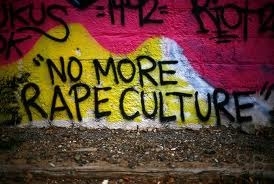Feminists We Love: Salamishah Tillet
By Darnell L. Moore and Aishah Shahidah Simmons
Dr. Salamishah Tillet is a feminist academic, activist, and writer. She is an Assistant Professor of English and Africana Studies at the University of Pennsylvania. Salamishah received her Ph.D. in the History of American Civilization from Harvard University in 2007. She also received her A.M. in English and American Literature from Harvard and her Masters in the Art of Teaching from Brown University. She graduated Phi Beta Kappa and Magna Cum Laude from the University of Pennsylvania where she received her B.A. in English and Afro-American Studies. She is the author of Sites of Slavery: Citizenship, Racial Democracy, and the Post-Civil Rights Imagination and is currently working on a book on the Civil Rights singer, Nina Simone. Salamishah has written for The Chicago Tribune, The Guardian, The Root, and The Nation, and has appeared on the BBC, CNN, HuffPost Live, MSNBC, and NPR. In 2010, she wrote the liner notes for John Legend and The Roots’s Grammy award-winning album, Wake Up!. In 2011, she interviewed Gloria Steinem on the future of the feminist movement at the TedxWomen conference. In 2003, Salamishah and her sister, Scheherazade Tillet, co-founded A Long Walk Home, Inc., a 501 (c) non-profit that uses art therapy and the visual and performing arts to end violence against girls and women. She was an associate producer for Aishah Shahidah Simmons’s groundbreaking documentary, “NO! The Rape Documentary” and is in Cambridge Documentary’s short film, “Rape Is…” In 2010, Salamishah and Scheherazade were finalists for Glamour Magazine’s “Women of the Year” award for their work to end violence against girls and women.
Salamishah: I’ve always loved this quote because I think it is a more radical take on the feminist adage that “the personal is the political.” For me, Toni’s message resonates deeply because my activism has always been prompted by my own journey of self-exploration. When I began my activism to end rape, for example, I was also in the midst of recovering from sexual assault in therapy. So, finding my voice as a survivor was symbiotically political and personal. But even more importantly, I believe that we can determine our politics by observing our personal choices and affiliations and our treatment of others. The persons we share our private moments with (the people we befriend, admire, like, and love) are an even bigger indicator of what we value and prioritize. Once you take the task of living your political commitments seriously, you know the self can be a vehicle for transformation and revolution.
TFW: You have a very clear commitment to Black feminist (anti-sexist, anti-racist, anti-violence, and anti-rape) politics. You are the co-founder, along with your sister Scheherazade Tillet, of A Long Walk Home, Inc., (ALWH) which uses art therapy and the visual and performing arts to end violence against girls and women. ALWH emerged through your sister’s creative response in the late 90s to support your healing from your sexual assaults. Will you share your process of moving from victim to survivor to advocate?
Salamishah: This is such a long story, but I will emphasize the crucial role that sisterhood has and continues to play in my healing. My journey began when I shared the story of surviving sexual violence with my younger sister, Scheherazade, when she was in college. At first, she responded with silence and a sense of powerlessness. A few years later, she asked if she could photograph my very active recovery process. So, she, and her camera, followed me to therapy, on my first dates with my partner, Solomon, to the gym, and even as I prayed. From that social documentary project, Scheherazade created the multimedia show, “Story of a Rape Survivor,” in which wonderful black women artists, like the singer Ugochi, dancer Logan Vaughn, and actresses Regine Jean-Charles and Patrese McClean bring my story of healing from rape to life.
At the same time, I was blessed to be in Philadelphia at the same time Charlotte Pierce-Baker published the first of its kind book, Surviving the Silence: Black Women’s Stories of Rape and Aishah Shahidah Simmons was making the extraordinary film “NO! The Rape Documentary.” They both mentored me and modeled the process of sharing a private trauma with a public audience. Over time and with the help of all these women and some men, I eventually transformed my shame and silence into survival. I moved from victim to advocate.
TFW: You participated in and wrote about the SlutWalk movement during a time when there was so many expressed dissenting feelings about this movement among many U.S.-based feminists of color. Why did you participate? What are your thoughts about how feminists of color and white feminists in the U.S. can work together across differences?
Salamishah: I participated because I was curious. In all of my years in the women’s movement, I had never heard of a march that was so directed, so focused, so explicit in its demands to refuse the shaming that women experience before and after they are raped. I love “Take Back The Night” too, but this seemed so in your face that I felt I had to participate before opting out altogether. Fortunately, I was part of a less controversial march in DC, hosted by Samantha Lewis, and with my good friend, a fellow (white) feminist, and founder of Stop Street Harassment, Holly Kearl.
I wrote “What to Wear to a SlutWalk” for The Nation because I was interested in forging alliances within this grassroots movement across racial lines and then the New York SlutWalk happened. There a young white woman carried a sign with the John Lennon/Yoko Ono song, “Woman is the Nigger of the World,” and I felt like any interracial momentum that could have been built was so easily and casually thrown away. And this really saddened me because those of us who care, especially feminists of color, about ending racism, sexism, and sexual violence, lost these big fights way too early.
TFW: You recently became the mother of a daughter. Congratulations! How has this changed your life? How do you define Black feminist mothering?
Salamishah: I still pinch myself to make sure she is real! I am so amazed that such a wonderful person chose me as her mother. I guess the biggest change is that I feel more indebted to the future—I really want her to grow up in a safe, equal, and just world. And I will do whatever I can to make sure that her world is better and more beautiful than ours. But equally as important, I am learning to enjoy the moment more. Each moment with her is so new and special that I easily get lost in time. I guess that is my definition of radical motherhood: fighting for a more radical future, while remaining deeply conscious of her needs and concerns in the present.
TFW: The fall 2012 release of your first book Sites of Slavery: Citizenship and Racial Democracy in the Post-Civil Rights Imagination (Duke University Press), explores how some of the leading African-American contemporary artists and intellectuals “turn to the subject of slavery in order to understand and challenge the ongoing exclusion of African Americans from the founding narratives of the United States.” “Lincoln” (Steven Spielberg) and “Django Unchained” (Quentin Tarantino) are two of the films that are nominated for Academy Awards in the Best Picture category. Both of these very different films address enslavement of African people through the directorial lens of White male directors. Will you share with us your thoughts about both films in the specific context of Sites of Slavery?
Salamishah: That is a big question, but what I can say is that my book, Sites of Slavery, concerns itself with big questions of citizenship, race, and democracy in the post-Civil Rights era. It comes out of my desire to understand why contemporary African-American artists and intellectuals are so preoccupied with returning to theme of slavery in their works and how their representations of the past help understand our racial present better. For example, why does Toni Morrison have two novels on slavery, Beloved and A Mercy, and how do these books get us to think differently and critically about America. My book covers a lot of such representations, from Barbara Chase-Riboud’s novel, Sally Hemings, to Kara Walker’s silhouettes, to slave fort tourism and reparations. In each case, I show how African Americans reconstruct these sites of slavery in order to write themselves back into American founding stories and reimagine a more racially inclusive country.
“Lincoln” and “Django” appear to be in conversation with the artists I focus on, but are also interested in something very different. For Speilberg, African Americans are neither subject nor salvific characters in his film. His film is all about the minutiae of the democratic process. I would have liked to have had those black characters who are in the film flushed out more. For example, Elizabeth Keckley and William Slade were not only Lincoln’s maid and butler; they were also radical abolitionists in their own right.
“Django” is different. In many ways, its excess seems to be the opposite of Lincoln’s absence of Black people. It is all about a spectacular or exceptional blackness displayed on screen and mostly at the expense of other narratives, like that of black collective resistance, which we often see in the contemporary African-American texts that I analyze in my book.
TFW: It is rumored that your next book will focus on the legendary and iconic singer, songwriter, civil rights activist Nina Simone. Many people have written about her and there’s a very controversial film about her life that’s in post-production. What do you plan explore in your book?
Salamishah: Nina is everywhere! Sometimes I wonder if she is more popular now than she was alive. Anyway, I am toying around with titles and topics now. But my most recent incarnation of the book examines Nina Simone’s collaborations: her inspirations from Bach and Billie, her political friendships with Lorraine Hansberry and Miriam Makeba, and her influence on hip hop.
TFW: In addition to being a mother and a partner, you are a professor, writer, cultural critic, activist, mentor, and an institution builder. That is the makings of a busy and full life. What motivates you? And, how do you achieve balance in the midst of your multiple identities, which are embodied into one?
Salamishah: I always feel like I can do so much because I have so much support. I truly live in a village of friends, family, and colleagues who help me find balance and pick up the slack when I cannot. I have been lucky in this way and I only hope people feel like I give as much as I receive.



4 Comments